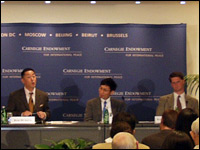Registration
You will receive an email confirming your registration.
IMGXYZ759IMGZYXOn September 13, 2007, soon after Japan Prime Minister Shinzo Abe announced his resignation, the Carnegie Endowment hosted a discussion entitled “Japan’s Political Shift and its Impact on the U.S. and East Asia” featuring guest speaker Dr. Koji Murata, professor of International Security Affairs at Doshisha University in Kyoto, Japan, and Mr. Randy Schriver, former Deputy Assistant Secretary of State for East Asian and Pacific Affairs. Moderated by Director of the China Program Dr. Pei Minxin, the seminar focused on two primary topics: Japan’s domestic political development in the aftermath of Mr. Abe’s resignation, and the implication it has on Japanese foreign policy regarding U.S, China, and rest of the Pacific Rim.
Prof. Murata provided a unique analysis on Mr. Abe’s decision to step down. He believed that Mr. Abe’s decision to resign was irresponsible; it came both too early and too late: too early in the sense that he could have waited until the Japanese Upper House defeats his bill to renew Japan’s naval operations in the Indian Ocean in support of the U.S war on terror; too late in the sense that he should have resigned after his party suffered a major defeat in the Upper House elections a few months ago. Prof. Murata also suspected that the decline of Mr. Abe’s health condition might have played a role in his abrupt resignation. Nevertheless, most analysts consider such decision as irresponsible, because it came at a peculiar time where leadership is much needed as the LDP just started its attempt to reach for compromise with the opposing Democratic Party, who currently controlled the Upper House.
As for the replacement of the position Mr. Abe left behind, Prof. Murata believes the most likely candidate is actually the 71 years-old veteran lawmaker Yasuo Fukuda, rather than Western media’s popular pick Taro Aso, who once served as the Foreign Minister. Mr. Aso has been a long-time supporter of Mr. Abe’s political agenda, and due to the fact that Abe’s popularity is now in an all-time low among the LDP, Mr. Aso’s close affiliation with the newly resigned Prime Minister has now become his largest political liability. In contrast, Mr. Fukuda has already gained significant supports from the majority of LDP, including former Primer Minister Junichiro Koizumi. The new Prime Minister of Japan will be decided no later than September 24th.
Prof. Murata then evaluated the potential impact Mr. Abe’s recent resignation had on several political issues within Japan, notably the prospect of the highly controversial bill regarding the extension of Japan Maritime Self Defense Force’s operation in the Indian Ocean. Although the Democratic Party blamed the deployment of Japanese military overseas (other than at Afghanistan) as illegal, Murata believes rejection of the bill has little significance, as LDP would implement the withdrawal from Indian Ocean as slowly as possible; in other words, the Maritime Self Defense Force would continue its operations regardless of the outcome of the bill.
Finally, Prof. Murata offered several challenges facing the next prime minister. First of all, Japan should continue its commitment in multi-lateral military operations, and the government has the responsibility to educate the general public in Japan about the importance of such commitment toward international society. Secondly, while most Japanese felt a sense of betrayal by the U.S because Washington did not back up Japan on North Korean abduction issue in the Six-Party Talk, the new prime minister must choose a pragmatic and practical approach in solving this issue. As for relation with China, Prof. Murata expressed his concern regarding the increase of mutual resentments between nationalists in both countries. The Japanese people, according to him, is suffering the so-called “apology fatigue,” even though the Chinese and the Koreans continue to demand apologies for the atrocities Japanese militarists committed during WWII. Prof. Murata argued that politicization of historical issue must be avoided, therefore such dispute should be solve by un-biased historians.
With extensive experience in East Asian affairs, Mr. Schriver provided his assessment on the potential impact of current political turmoil in Japan from the U.S perspective. The resignation of Mr. Abe has more to do with his own lack of coherence, discipline, and competence in domestic policies than his handling of U.S-Japan relation. While remarkable progresses have been achieved in the U.S-Japan alliance over recent years, there are still numerous disagreements between the two nations. Among all the disputable issues within U.S-Japan relation, Mr. Schriver pointed out in particular the refusal from the U.S Congress to allow Japan Self Defense Force to acquire F/A-22 Raptor, the world’s most advanced fighter plane. Although Mr. Schriver himself is highly in favor of lifting such restriction, he doubted Congress can be convinced easily, given the highly sensitive technology and the unique capability possessed by F/A-22. He suggested that Japan “get into the queue” first and waits things to change on Capital Hill.
Nevertheless, from the U.S perspective, the future of U.S-Japan relation remains positive, and the alliance would still be the core of U.S foreign policy in the Pacific Rim. In the long run, Japan would continue to play a critical role in assisting U.S to address most global issues.
Dr. Minxin Pei concluded the panel with his own remark on this topic from China’s perspective. Despite the continuing existence of mistrust between the two nations in strategic issues, the Chinese leaders would continue to invest significantly in stabilizing the Sino-Japanese relation. The forthcoming appointment of former Chinese Ambassador to Japan Mr. Wang Yi as the No.2 person in the Foreign Ministry of China is a clear indication that Sino-Japanese relation remains a priority in Beijing’s foreign policy, regardless of the domestic political struggle in Japan.
The seminar ended on an optimistic note as all three panelists were confident that Japan would not radically change its foreign policy, despite the ongoing political turmoil.
